

E3A Understanding Energy: Needs Assessment
Reviewed
Editor’s note
The following abstract describes a publication that is only available as a downloadable PDF.

E3A Small Wind: Small Wind Energy Checklist
Reviewed
Editor’s note
The following abstract describes a publication that is only available as a downloadable PDF.
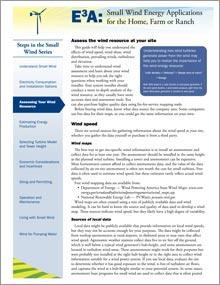
E3A Small Wind: Assessing Your Wind Resource
Reviewed
Editor’s note
The following abstract describes a publication that is only available as a downloadable PDF.

E3A Understanding Energy: Green Building Programs for High Performance and Energy Efficiency
Reviewed
Editor’s note
The following abstract describes a publication that is only available as a downloadable PDF.

E3A Small Wind: Economic Considerations and Incentives
Reviewed
Editor’s note
The following abstract describes a publication that is only available as a downloadable PDF.

Chief Officer, Fourth Edition Exam Prep
New $28
This Exam Prep is designed to be used as a self-study tool for students to prepare for comprehensive end of course tests and the written portion of a certification exam. It contains more than 500 multiple choice questions based on the Chief Officer, Fourth Edition Manual.

E3A Understanding Energy: Carbon and Energy in the United States
Reviewed
Editor’s note
The following abstract describes a publication that is only available as a downloadable PDF.
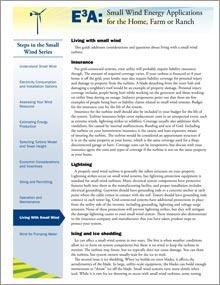
E3A Small Wind: Living With Small Wind
Reviewed
Editor’s note
The following abstract describes a publication that is only available as a downloadable PDF.
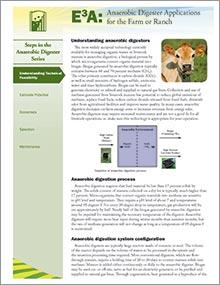
E3A Anaerobic Digesters: Understanding Technical Feasibility
Reviewed
Editor’s note
The following abstract describes a publication that is only available as a downloadable PDF.
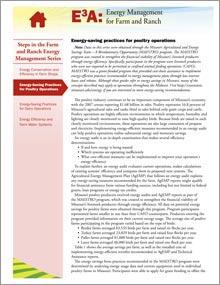
E3A Farm Energy: Energy-Saving Practices for Poultry Operations
Reviewed
Editor’s note
The following abstract describes a publication that is only available as a downloadable PDF.
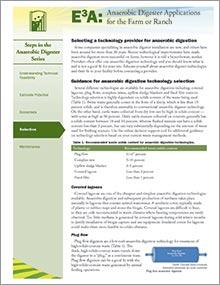
E3A Anaerobic Digesters: Selection
Reviewed
Editor’s note
The following abstract describes a publication that is only available as a downloadable PDF.

E3A Solar Electricity: Introduction
Reviewed
Discover photovoltaic technology. Dispel some myths about the cost of a photovoltaic system. Learn about energy payback, PV technology and solar cells.

E3A Solar Hot Water: Building and Site Assessment
Reviewed
Editor’s note
The following abstract describes a publication that is only available as a downloadable PDF.

E3A Solar Electricity: System Options
Reviewed
Learn about the four most common solar electric system options: grid-connected systems with or without batteries, off-grid systems and PV-direct systems.
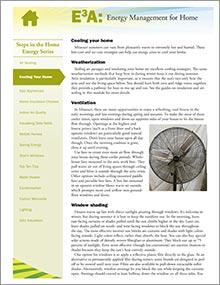
E3A Home Energy: Cooling Your Home
Reviewed
Editor’s note
The following abstract describes a publication that is only available as a downloadable PDF.

E3A Solar Hot Water: System Sizing
Reviewed
Editor’s note
The following abstract describes a publication that is only available as a downloadable PDF.

E3A Solar Electricity: Costs
Reviewed
Learn about the costs of a solar electric system, how to estimate cost savings and simple payback for a net-metered photovoltaic (PV) system, and more.
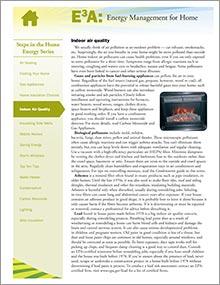
E3A Home Energy: Indoor Air Quality
Reviewed
Editor’s note
The following abstract describes a publication that is only available as a downloadable PDF.
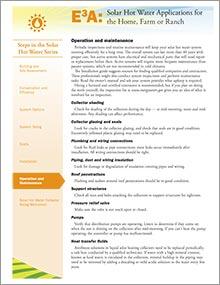
E3A Solar Hot Water: Operation and Maintenance
Reviewed
Editor’s note
The following abstract describes a publication that is only available as a downloadable PDF.

E3A Solar Electricity: Electricity Use Worksheet
Reviewed
Use this electricity-use worksheet to estimate your energy use and help you determine what size solar electric system would meet your energy needs.

E3A Home Energy: Mobile Homes
Reviewed
Editor’s note
The following abstract describes a publication that is only available as a downloadable PDF.
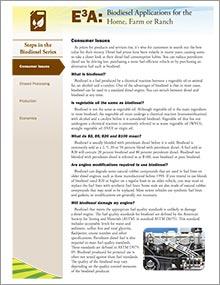
E3A Biodiesel: Consumer Issues
Reviewed
Editor’s note
The following abstract describes a publication that is only available as a downloadable PDF.

E3A Home Energy: Water Heater
Reviewed
Editor’s note
The following abstract describes a publication that is only available as a downloadable PDF.
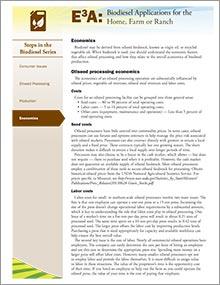
E3A Biodiesel: Economics
Reviewed
Editor’s note
The following abstract describes a publication that is only available as a downloadable PDF.
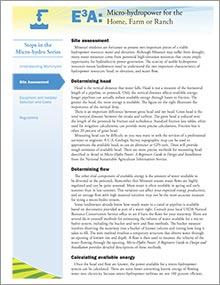
E3A Micro-hydro: Site Assessment
Reviewed
Missourians are fortunate to possess two important pieces of a viable hydropower resource: water and elevation. Learn about these two important characteristics of hydropower in this guide.